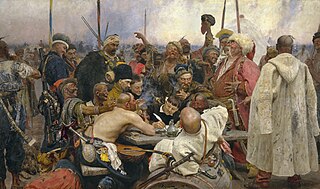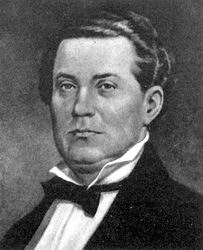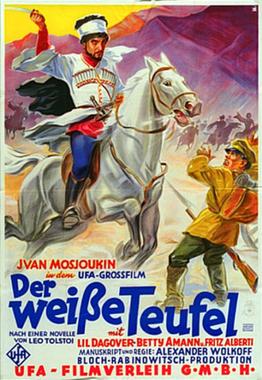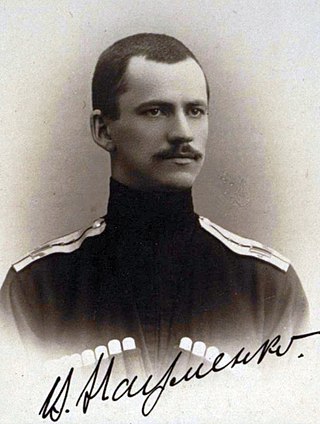Related Research Articles

The Cossacks are a predominantly East Slavic Orthodox Christian people originating in the Pontic–Caspian steppe of eastern Ukraine and southern Russia. Historically, they were a semi-nomadic and semi-militarized people, who, while under the nominal suzerainty of various Eastern European states at the time, were allowed a great degree of self-governance in exchange for military service. Although numerous linguistic and religious groups came together to form the Cossacks, most of them coalesced and became East Slavic-speaking Orthodox Christians. The Cossacks were particularly noted for holding democratic traditions. The rulers of the Polish–Lithuanian Commonwealth and Russian Empire endowed Cossacks with certain special privileges in return for the military duty to serve in the irregular troops. The various Cossack groups were organized along military lines, with large autonomous groups called hosts. Each host had a territory consisting of affiliated villages called stanitsas.

Don Cossacks or Donians, are Cossacks who settled along the middle and lower Don. Historically, they lived within the former Don Cossack Host, which was either an independent or an autonomous democratic republic in present-day Southern Russia and parts of the Donbas region of Ukraine, from the end of the 16th century until 1918. As of 1992, by presidential decree of the Russian Federation, Cossacks can be enrolled on a special register. A number of Cossack communities have been reconstituted to further Cossack cultural traditions, including those of the Don Cossack Host. Don Cossacks have had a rich military tradition - they played an important part in the historical development of the Russian Empire and participated in most of its major wars.

Dmitry Stepanovich Bortniansky was a Russian Imperial composer of Ukrainian Cossack origin. He was a composer, harpsichordist and conductor who served at the court of Catherine the Great. Bortniansky was critical to the musical history of both Ukraine and Russia, with both nations claiming him as their own.

Pyotr Nikolayevich Krasnov, also known as Peter Krasnov, was a Russian military leader.

And Quiet Flows the Don is a novel in four volumes by Russian writer Mikhail Sholokhov. The first three volumes were written from 1925 to 1932 and published in the Soviet magazine Oktyabr in 1928–1932, and the fourth volume was finished in 1940.

A Cossack host, sometimes translated as Cossack army, was an administrative subdivision of Cossacks in the Russian Empire. Earlier the term viisko referred to Cossack organizations in their historical territories, most notable being the Zaporozhian Host of Ukrainian Cossacks.

Semen Stepanovych Hulak-Artemovsky, was an Imperial Russian opera composer, baritone, actor, and dramatist.

Mohammad-Taqi Khan Pessian, more commonly known as Colonel Pessian, was an Iranian gendarme, fighter pilot and warlord who formed and led the short-lived Autonomous Government of Khorasan in 1921. He was killed in a battle with forces sent by Ahmad Qavam, the prime minister at the time.

Zaporozhets za Dunayem is a Ukrainian comic opera with spoken dialogue in three acts with music and libretto by the composer Semen Hulak-Artemovsky (1813–1873) about Cossacks of the Danubian Sich. The orchestration has subsequently been rewritten by composers such as Reinhold Glière and Heorhiy Maiboroda. This is one of the best-known Ukrainian comic operas depicting national themes.

Rudolf LotharGerman pronunciation:[r'uːdolfl'oːtar] was an Austrian playwright, librettist, critic and essayist. He was born and died in Budapest.
Bantcho Bantchevsky was a Bulgarian-born American singer, singing coach, and translator. He died by suicide at the Metropolitan Opera in New York City during a nationally broadcast performance.

Serge Alexis Jaroff was the founder, conductor and composer of the Don Cossack Choir Serge Jaroff.

Kuban Cossack Chorus is one of the leading Folkloric ensembles in Russia. Its repertoire and performances reflect the songs, dances and folklore of the Kuban Cossacks.

The Don Cossack Choir Serge Jaroff was a men's chorus of exiled Cossacks founded in 1921 by Serge Jaroff and conducted for almost sixty years by him.
Michael (Gregory) Minsky, born Michael Spirin (Spiridonov), also known as Mino Minzer and between Ukrainians as Myhailo Minsky was a baritone singer, one of the finest interpreters of Russian and Ukrainian songs, and a conductor of the Don Cossack Choir Serge Jaroff.
Christophorus Records is a German classical music label based originally in Freiburg im Breisgau specializing in Catholic church and early music.

The White Devil is a 1930 German historical drama film directed by Alexandre Volkoff and starring Ivan Mozzhukhin, Lil Dagover and Betty Amann. It was based on Leo Tolstoy's 1912 novella Hadji Murat. It was originally made as a silent film, with a soundtrack added later. Anatole Litvak worked as the film's assistant director and production manager. It was shot at the Bebelberg Studios in Berlin. The film's sets were designed by the art directors Alexandre Lochakoff and Vladimir Meingard. After location shooting in Nice, Switzerland and the French Alps during 1929, it premiered at the Ufa-Palast am Zoo in January 1930.
Mikhail Mikhailovich Zlatopolsky was a Soviet and Russian singer and occasional actor. Zlatopolsky was listed as the lowest bass in the world with a documented low note of C1.

Yes, Yes, Love in Tyrol is a 1955 West German musical comedy film directed by Géza von Bolváry and starring Gerhard Riedmann, Hans Moser, and Doris Kirchner. It is a loose reworking of the plot of the play Kohlhiesel's Daughters by Hanns Kräly.

Vyacheslav Grigoryevich Naumenko was a Kuban Cossack leader and historian.
References
- ↑ Der Spiegel: Issues 45-48 Rudolf Augstein - 1996 "Jaroffs Kosakenensemble, 1921 von Russen im türkischen Exil gegründet, trat bis zu seiner Auflösung ... Sängern unter Leitung des niederländischen Dirigenten Marcel "Nicolajevich" Verhoeff, ebenfalls als Jaroffs Erbe."